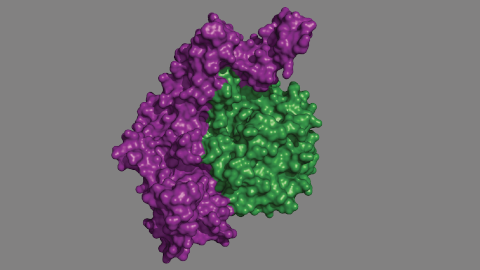Imperfection in pathogenic bacteria strategy opens the door to the design of new antibiotics

A study led by UAB researchers for the first time observed that bacterial proteins, when binding to human cells, use structural imperfect mimicry of their host’s protein complexes. The research, published in PLoS Computational Biology, allows setting the bases for new antibiotics capable of fighting multi-drug resistant microorganisms.
18/12/2020
Bacteria interacts with other bacteria and other types of cells through different protein complexes. Pathogenic bacteria, the cause of infections, in particular need to interact with host cells to ensure survival and proliferation. A research team led by researchers from the UAB Department of Biochemistry and Molecular Biology has studied in detail these protein complexes occurring between bacteria and hosts, which is known as “interactome”, and its essential role in bacterial infections.
Using computational models, researchers analysed the characteristics of the host-pathogen complexes which allow distinguishing them from the rest of interactions (pathogen-pathogen and host-host). In this study, researchers focused on the case of interactome between the bacteria Yersinia pestis, which causes bubonic plague, and human cells. The research team observed how the bacterial proteins involved in the infection mimic interfaces to interact with the host, but that such mimicry is imperfect. This imperfection is probably due to restrictions in the evolution of the pathogen itself.
The authors of the research highlight that interactions occurring in host-pathogen complexes, with these imperfections, would allow producing specific antibiotics capable of fighting against complicated bacteria, including multi-drug resistant microorganisms. In addition, thanks to this imperfect mimicry, the antibiotics would cause very little side effects, given that they could be specifically directed towards the host-pathogen complexes without interfering with other complexes existing in the host.
The research, coordinated by Professor Marc Torrent of the Department of Biochemistry and Molecular Biology at the Universitat Autònoma de Barcelona (UAB), also included the participation of Centre for Genomic Regulation (CRG) researcher Natalia Sánchez. The study was recently published in PLoS Computational Biology (PCB), one of the most influential journals of the computational biology field.
Original article:
de Groot NS, Torrent Burgas M (2020) Bacteria use structural imperfect mimicry to hijack the host interactome. PLoS Comput Biol 16(12): e1008395. https://doi.org/10.1371/journal.pcbi.1008395